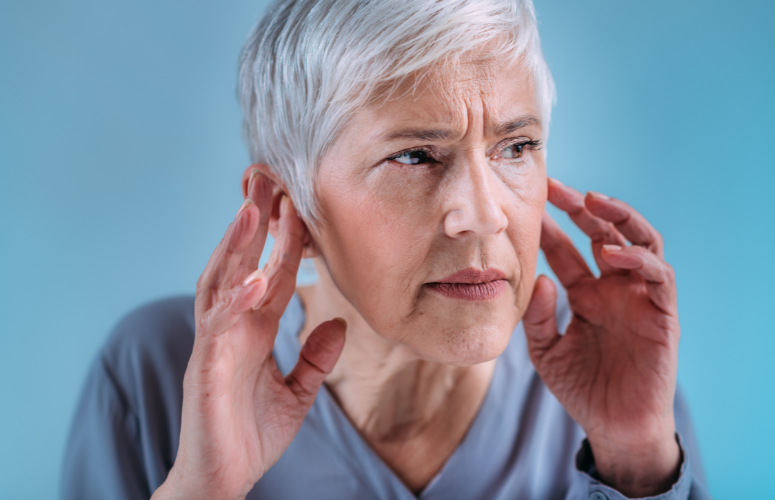What are the symptoms of Sudden Hearing Loss?
A sudden hearing loss is a rapid drop in hearing, typically only in one ear, that occurs over a period of 3 days or less. Associated symptoms may include:
- Tinnitus (ringing or buzzing sounds in the ear)
- A blocked sensation in the affected ear
- Dizziness
- Nausea
- Difficulty understanding speech
- “Muffled” hearing
What causes Sudden Hearing Loss
Sudden hearing loss is due to damage to the nerve cells and/or delicate structures in the inner ear. Over 90% of cases are idiopathic which means there is no clear cause. It may be related to a viral infection or reduced blood flow to the inner ear but usually there is no way to confirm this. In a very small number of cases the cause is identified. In such instances the causes may include:
- Known Viral Infection: These include Herpes Simplex Virus, Cytomegalovirus, Meningitis, Lyme Disease, HIV, Mumps, Syphilis and possibly COVID.
- Blood Circulation Problem: Reduced blood flow to the inner ear can deprive it of oxygen and nutrients causing damage to the nerve cells and other structures responsible for hearing.
- Autoimmune Diseases: These include Lupus, Guillain-Barre and Cogan’s Syndrome. They can trigger a sudden hearing loss by causing inflammation in the inner ear.
- Trauma: A head injury can lead to a Sudden Hearing Loss.
When should I see my Doctor?
A sudden hearing loss is a medical emergency and it is of utmost importance to seek immediate medical attention. There is only a small window in which treatment may work and this is usually less than 7 days after the loss.
How is Sudden Hearing Loss diagnosed?
Sudden hearing loss is diagnosed from the patient history and a comprehensive hearing test. It is of very important that the doctor refers you to both an Audiologist and an Ear Specialist. At Neurosensory we will ‘fit you in’ immediately and arrange an appointment with an Ear Specialist on the same day. A detailed case history and a comprehensive hearing assessment will be performed including a hearing test, speech tests and a test of middle ear function. The degree of hearing loss can vary widely in cases of sudden hearing loss ranging from a mild loss to a profound loss with no measurable hearing.
How is Sudden Hearing Loss treated?
The cause of sudden hearing loss is usually not known. The primary treatment for sudden hearing loss is corticosteroids (steroids). These can help reduce inflammation and swelling in the inner ear. Corticosteroids can be taken orally or injected into the inner ear by an Ear Specialist. The treatment is initiated as soon as possible after the onset of symptoms and will not be successful if prescribed more than 7 days following the loss of hearing.
If the hearing doesn’t improve with steroids alone hyperbaric oxygen therapy may be recommended. This involves breathing pure oxygen in a pressurised chamber which can increase the amount of oxygen delivered to the damaged ear.
If the cause is known the treatment will be targeted to it. For example, if it is related to an autoimmune disease, immunosuppressant drugs will be prescribed.
The hearing may return within the first 3 days or more slowly over a 6-month period. In many cases, it will not return but there are other avenues for treatment and management including a hearing aid or hearing implant.
What happens if my hearing doesn’t return?
There are 3 outcomes for people who are treated for a sudden hearing loss.
- The hearing returns to normal within a period of 3 days to 6 months
- Some hearing returns and it may fluctuate.
- The hearing doesn’t return. If this is the case, be reassured that the team at Neurosensory can assist with hearing aids or implants which will allow you to get back to living your life as normal.
A sudden hearing loss is very distressing, but it is important to know that there are a number of advanced amplification options that the Audiologists at Neurosensory can discuss with you. Neurosensory is one to the few Audiology organizations that can assist you with hearing aids and implants. The most suitable device/s will depend on the degree of loss and your lifestyle. These include:
A hearing aid on the affected ear
This can assist with both the hearing loss and tinnitus suppression.
A CROS device
This consists of two separate devices, both of which look like a hearing aid. One of the devices is worn on the ear with normal hearing and the other is worn on the ear with the hearing loss. The device on the poor ear contains a microphone that picks up the sound and sends it to the good ear
Bone Conductor Implant
This is surgically implanted and transmits sound vibrations directly to the inner ear through the bones. It sits on the poor side and picks up the sound transmitting it to the normal hearing ear. This may be recommended when other hearing aid options are not suitable.
Cochlear implant
This may be a good option when the loss on the poor side is severe to profound and minimal benefit is provided by a conventional hearing aid. A cochlear implant consists of an implant and an external component. The sound is sent directly to the auditory never bypassing the damaged parts of the ear. It can assist with both the hearing loss and tinnitus.

